The developerâs boss recalls hanging out with The Clash, falling into crevasses â and reveals why the office is not dead. Dave Rogers reports
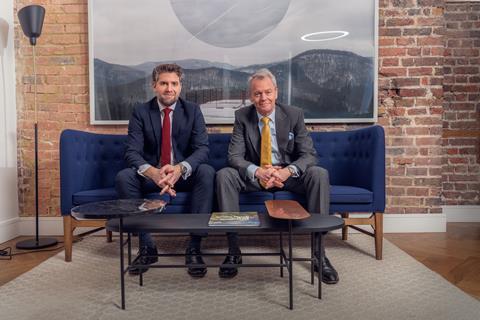
âI just wanted to get the hell out of the there.â Bradley Baker is talking about the time he fell into a crevasse after a snow bridge â best described as a bridge of snow straddling a crevasse â he was walking over collapsed on the way back down from the summit of the Eiger in Switzerland.
âI was probably 30ft down on the end of a rope. Youâre dangling in a deep freeze surrounded by miles of ice. I couldnât see the bottom. I bridged myself up and flopped out. It was quite scary but you live and learn.â
Baker, since the end of 2021 chief executive of London developer CO-RE, has not let the experience put him off and has plans to tick off a climb in Nepal, the 6,812m high Ama Dablam â sometimes known as the Matterhorn of the Himalayas because of its similarity to the tooth-shaped mountain which straddles Switzerlandâs border with Italy.
âIt is one of the steepest in the Himalayas,â he says. âIâd like to do it but it would mean quite a lot of time off work.â
Right now, Baker has his hands full, so getting weeks off might not that be that easy. CO-RE, which is an abbreviation for City Office Real Estate, is behind several high-profile schemes in the capital and is waiting on the outcome of a planning inquiry on another â 72 Upper Ground â that has so irked locals on the South Bank they have united in a way not seen since the days of the relentless opposition to the Garden Bridge.
Baker says he is âoptimistic and hopefulâ about the impending decision, which is expected to be made by Michael Gove this summer. The communities secretary first put the cat among the 72 Upper Ground pigeons last spring when he effectively put a stop to work with a so-called Article 31 notice.
As the Johnson government began its death spiral last summer, Gove found himself sacked and the scheme was actually called in by one of his replacements, Greg Clark, only for Gove to return to the post last autumn. It means that the man who stopped the job in the first place will have the final say.
Baker is too diplomatic to offer a view but defends the project, designed by Make, and which has a 13-storey building at one end and a 26-storey one at the other with a terrace in between.
âItâs very high-profile, itâs right where the river bends,â he adds. The plans will see ITVâs London studios, for older readers the LWT studios, a 1970s block Baker says is no longer fit for purpose, flattened and replaced with 600,000 sq ft of mixed-use real estate.
Most involved in the case agree that the scheme has been called in because of its size: opponents think it is too big â âinappropriate, out of context and harmfulâ to its South Bank setting, they told the recent inquiry. CO-RE, which is working on behalf of client Mitsubishi Estate London, says it will regenerate that part of the capital and put significant investment into Lambeth, one of Londonâs poorest boroughs.
âSome buildings have good bones and you can keep them,â adds Baker. âThis building was a studio, bespoke for LWT and â quelle surprise â it doesnât work as an office building.
âI think itâs a good addition to the South Bank and I really do believe the scheme is exemplary. These buildings attract a lot of attention. When The Gherkin first started life, it had all sorts of negativity. I think this will become a very much-loved building.â
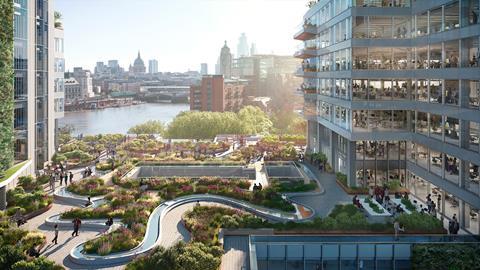
But Baker knows that Gove might not agree. So whatâs the plan B?
âI think there would be an ongoing dialogue to see what could be done. [If it was refused] we would have to look at the reasons and address those reasons.â
It is the first time that CO-RE has ever had to face a planning inquiry since it was set up in 2000 by former Greycoat directors Chris Strickland, David Ainsworth, now executive chairman, and the late Julian Vickery, who passed away last November.
Baker joined the firm â which, given the size of projects it is working on is remarkably lean with just 16 staff â in 2017 after nearly 30 years working for the commercial bit of Knight Frank. âI always wanted to go on the development side,â he says, before deadpanning: âI took my time.â
He admits: âWeâre not a massive company but weâve grown a lot and doubled in size as weâve taken on more work.â
CO-REâs current jobs are spread across several bits of London. As well as 72 Upper Ground, at the moment set to be built by Lendlease, it is also working on the AHMM-designed redevelopment of Lansdowne House in Berkeley Square, 120 Fleet Street, a redevelopment of Goldman Sachsâ former office by BIG and the neighbouring Art Deco former HQ of the Daily Express.
Then there is Stonecutter Court, pretty much opposite 120 and designed by TP Bennett, and Stiff & Trevillionâs Fitzrovia building on Tottenham Court Road. Another scheme, Makeâs 20 Ropemaker Street, which Skanska is working on, is due to finish by the summer.
The client on that is Old Park Lane Management and Baker adds: âWeâre very fortunate to have great clients to work with who allow us to put our pennyâs worth in.â He singles out Lansdowne House for Audley Property as one of its key wins recently.
It will be built by Mace, which is also working on Stonecutter Court, and Baker says: âIt was a very prestigious job to win.â Bakerâs colleague, director Luke Wainwright, who deals with the contractors, says: âSince Bradley joined, weâve had a very decisive client-winning approach.â
But the firm missed out on 1 Undershaft, the Eric Parry tower set to be the tallest in the City, to Stanhope. âWe worked with Eric on 10 Fenchurch Street,â Baker says. âWe think heâs a great architect. Who wouldnât be disappointed? We wouldnât have minded doing one of Londonâs tallest towers.â
âThe knee-jerk reaction was that the office was dead. Iâm not saying weâre quite back to where we were, but the desire to get into the office is strongâ
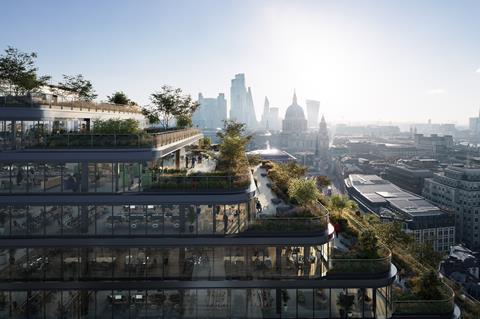
For Baker, there is no doubt the office is here to stay after its future was questioned by the pandemic. âAfter [the] 9/11 [terrorist attacks in New York in 2001], everyone said no one would work in a tall tower again. After covid, everyone was going to need bigger lifts.
âThe knee-jerk reaction was that the office was dead. Iâm not saying weâre quite back to where we were, but the desire to get into the office is strong.
âIt is mentoring, learning, team culture. You can do [remote working] for a short while but, as a long-term idea, itâs fundamentally flawed.
âHow do you build a team spirit, how do you get enjoyment out of work? Itâs not just through a screen, itâs about meeting up, having a drink, proper interaction.â
He says occupiers are using the office as a weapon to attract staff to their business. âThey are now prepared to pay for a premium product. They want to get people back into the office.
âTheyâve always liked terraces and the ESG [environment, social and governance] agenda but covid came along and turbo-charged that. Theyâre all rushing around in the war for talent and to do that with a shabby building is tough. But, if youâre doing it with a building that says a lot about your brand as a company, then the market is strong.â
CO-REâs scheme at 120 Fleet Street is a case in point. As well as a possible art gallery in the old Express building, terraces have been designed to be 20m long and 7m deep, to be used for all sorts of events from meetings to group yoga classes.
âOccupiers want more of the same but enhanced,â he says. âDifferent uses within the building are really important. Big companies want to promote their brand and core values through the building.â
Occupiers, he adds, do not mind if it is a new-build or refurbishment âprovided the quality of the building is there and the floorplate is efficient. They want big floor to ceiling heights, natural light, windows that open.
âWe do see opportunities in the retrofit market. Is the case for knocking a building down more difficult than it used to be? Yes, but that doesnât mean there is no case for demolition if a building is poor and not fit for refurbishment.â
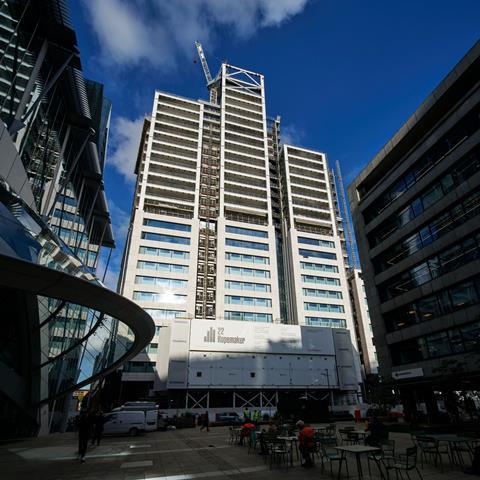
As well as Mace and Lendlease, CO-RE is working with Kier on the Fitzrovia scheme and, like its peers, competing for the best project teams to work on its jobs.
Wainwright says: âThere is a fair amount on the drawing board, so itâs up to us to position our projects in the best possible light, so we get the interest of those [Tier 1] contractors. If youâre delivering a best-in-class project, you need a best-in-class contractor.â
He points out that the firm is always minded towards competitive tendering, rather than negotiated deals. âClients require to see that, as part of their funding requirements.â
Its bid model is two-stage lump sum, adding: âOur clients want the comfort of lump sum.â
Baker says he expects interest in new offices to get stronger this year, despite gloomy predictions about the UK economy. âIt takes four or five years to deliver these sorts of projects. Theyâre not delivering them in 2023.
âWhatâs the market going to be like then? How much space out there is of the aspiration-quality end? And the answer is probably not very much. And thatâs what people are looking at.â
Clash City rocker
Cliche has it that chief executives tend to like Phil Collins and not much else. So not many can say they have hung out with The Clash.
âI was backstage with Joe Strummer and he gave me a cassette of some band he was into,â CO-REâs chief executive Bradley Baker recalls. âThis would be about 1979/80.
âIâd probably say they were the best band I saw. Their energy was amazing.â
He even managed to get them to play his favourite Clash song, Stay Free. âI shouted out from the crowd for it, Joe asked [guitarist] Mick [Jones] and they played it.â
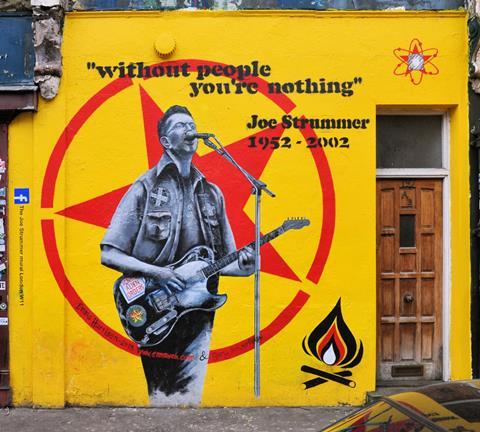
Born in 1962, a passion for music was inevitable given that Baker grew up in Shepton Mallet, Somerset, just outside Glastonbury. David Bowie headlined the very first festival in 1970 and the number of times Baker saw him runs into double figures.
He nevertheless winces at the memory of not being able to see him in the late 1970s after a chance came and went because he was stuck with his parents at Earls Court. âI first saw him a couple of years later.â
Other bands on his gig CV, include The Jam and the Smiths. âI saw some terrible fights in concerts where bands had to stop playing,â he adds. âThe Stranglers was one. The bassist, JJ Burnel, ended up knocking someone out.â
He recalls hitch-hiking to see a reformed Cure at the tiny Bath Moles club, queueing outside the venue without a ticket, having a chat with Robert Smith and then being promised by the singer that he would get him and his friend in.
âThe music was coming through the door. Weâre outside, a bloke opens the door, thereâs a rush and he shouts: âIs there a Brad Baker plus one here?â
âI said âyesâ and he said âyouâre inâ. We were escorted to the front of the stage, it was amazing.â
Married with two children, aged 17 and 20, nowadays itâs chess, fitness and mountains. âI go climbing a bit.â
The Eiger, Matterhorn, Mönch, all of which Baker has summited, is a bit more than âa bit of climbingâ for most. He was hooked by it in his 20s during visits to the Lake District and, despite turning 61 this year, has no plans on ditching the crampons just yet. âIâd like to do something in the Himalayas.â
Bradley Baker and Luke Wainwright CVs
Bradley Baker graduated with a land management degree from Leicester Polytechnic in the mid-1980s, joining Jones Lang LaSalle where he stayed for three years before leaving for Knight Frank where he founded and headed up the firmâs Central London Tenant Representation team.
Schemes he worked on included Fostersâ Swiss Re building, better known as The Gherkin. âWe had to keep Swiss Re a metre shorter than Tower 42 to have an easier ride through planning,â he laughs.
He joined CO-RE in 2017 and was made chief executive at the end of 2021.
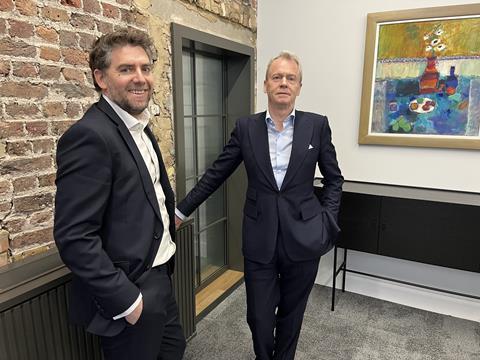
Luke Wainwright joined CO-RE in 2015 from Second London Wall, where he was a project manager. A graduate in project management from Brighton University, the 45-year-old is now a director and in charge of dealing with contractors.
Married with a 14-year-old and 12-year-old, he lives west of London and admits: âMost weekends, I chauffeur my children around to sporting events. Iâm still in that wonderful world.â
























No comments yet